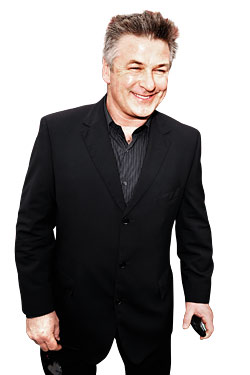
Alec Baldwin is scrolling through a collection of music his teenage daughter, Ireland, uploaded to his laptop. We’re in his dressing room on the set of 30 Rock, at Silvercup Studios, just after 11 a.m., and Baldwin is chuckling at the names. “What do we have here? Lil Wayne?” He shimmies a bit in his seat. “Lupe Fiasco. M.I.A. Kelis?” he continues, incorrectly emphasizing the first syllable of her name. When I tell him it’s “ke-LIS,” he responds “Oh, so you know these people? You do! So you’re a popular-music fan?”
Baldwin’s more of a classical-music guy, and proud of it. It’s been fundamental to how he defines himself since the day in the early eighties when he flipped on his car radio and, as he has described it, “Mahler came and got me on the San Diego Freeway.” Which is why it means so much to him that he’s now host of the New York Philharmonic’s weekly, nationally syndicated broadcast on WQXR radio. September 16, the orchestra’s opening night, is also his debut; it will be simulcast on Channel 13, too.
The Philharmonic offered him the role after Baldwin daydreamed about such a gig to The New Yorker last year. “To do this show, with all of its attendant silliness,” he says of 30 Rock, “it made me want to run and do something like that.” (Which isn’t to say he’s not excited about the possibility of winning a second Emmy as Jack Donaghy this Sunday.)
In his dressing room, where the radio is tuned to WQXR “all day long,” Baldwin makes no apologies for his anti–Top 40 feelings. It’s part of his growing up. “Popular music has an emotional-intelligence quotient that’s geared much toward younger people,” he explains. “It’s all about”—he flattens his voice to a disaffected teen monotone—“ ‘You left me. Why did you leave me? I still love you. I tried so hard to stop loving you.’ And it’s like, well, I relate to that, I just don’t want to think about that. When you’re younger, you want to wallow in it. When you get older, you still love the person, and wonder why they don’t love you. You just have other things to do.” Baldwin had a relentlessly troubled relationship to his now-ex-wife, Kim Basinger, of course. It hit the news when a most unfatherly voice mail he left for Ireland somehow came out.
Since that day on the freeway, he’s dedicated himself to classical autodidacticism about Chopin, Rachmaninoff, and Mahler. “I’d order pieces and read the liner notes on the most simplistic level about Sibelius and all of those other people I’d listen to in the beginning,” he says. “Someone would say, ‘A new book is coming out on [Leonard] Bernstein.’ I’d read that book. And I’d understand what was behind the music. Bernstein is very interesting to me because apparently he had appetites for every type of music.”
An assistant appears to inform him that he’s needed on set. (“I’ve got A.B.,” the assistant barks into a walkie-talkie. “He’s walking.”) Fueled by a caffeinated concoction he refers to as his “acting juice,” Baldwin barrels through a few takes, spouting a stream-of-consciousness patter on breaks, careening between a rumor that squirrel fur is used as doll hair to telling Judah Friedlander he’s going to buy him the DVD of The Misfits (“Gable! Gable trying to hold his own with a bunch of Method actors!”).
But he’s stuck on Bernstein. Back in his dressing room, he calls up a YouTube clip of Bernstein conducting and performing Rhapsody in Blue. “Oh, my God. Oh, my God. You can watch so much great stuff,” he says of YouTube’s classical offerings. Baldwin says he hopes to “get out of the way of the music,” as a host, before launching into color commentary. “He’s conducting them while he’s playing! And now he’s down! And now he’s up! They’re not showing enough of him.”
There’s a lull in the music, and Baldwin gets a bit sentimental. “Living the way I live now, being who I am now, what would be the next thing for me?” he whispers. “To marry a woman in the orchestra. A woman who could play the piano for me every night. That would be heaven.” On the little screen, Bernstein’s letting loose now, swerving across his piano bench, and Baldwin seems to lose himself in the clip. “Look at this guy! Like he’s Billy Joel! Look at him. He’s in ecstasy!” He begins to pound his fingers on the desk in time to Bernstein’s playing. “Look at the hair! He’s like a rock star. I hate that phrase. I hate it, but you can count on one hand how many non–rock stars that really applies to, and this guy is one.” He’s still pounding, and the desk is beginning to shake ever so slightly. “Look at him!”